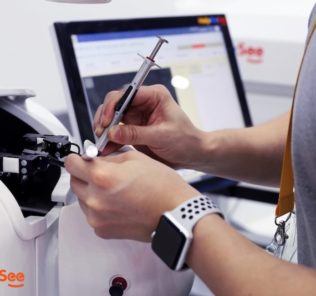HelpMeSee Non-Profit Unveils New Cataract Surgery Simulator with Mission to Cure World’s Blind
A new Cataract Surgery Simulator was unveiled on “World Sight Day” today by the global 501(c)3 not-for-profit organization HelpMeSee, which has a mission to end the backlog of cataract blindness and visual impairment especially in developing countries. As we all celebrate World Sight Day today with the #Hoepin Sight, we applaud HelpMeSee President and CEO Saro Jahani and the entire non-profit team for the launch of this new cataract eye surgery simulator, along with their available ebooks and courses to help millions gain back their vision!
HelpMeSee, the not-for-profit global campaign to end cataract blindness, today announced a landmark achievement in medical simulation training with the completion of its Eye Surgery Simulator. Equipped with sensory touch feedback and realistic virtual graphics, the HelpMeSee Eye Surgery Simulator, incorporated within the HelpMeSee Training Program, supports the training of cataract specialists on the Manual Small Incision Cataract Surgery (MSICS) procedure, a solution that could help end the global cataract blindness crisis.
“The HelpMeSee team, as well as technology partners Harman, InSimo, and SenseGraphics, are pleased to announce this medical advancement on World Sight Day, an event to advance vision health across the globe,” said HelpMeSee President and CEO Saro Jahani. “The HelpMeSee Eye Surgery Simulator overcomes the traditional restraints of cataract surgery training with unlimited virtual practice opportunities. It also offers the benefits of remote simulation-based training during the COVID-19 pandemic, limiting the risks of exposure to coronavirus infection.”
Sponsored Content:
One hundred million people across the world are blind and severely visually impaired because they cannot access cataract surgery, according to the International Association for the Prevention of Blindness (IAPB). The HelpMeSee Simulator and training program along with partners can develop a significant number of cataract specialists that public health experts say are needed to address the developing world ophthalmologist shortage, a factor behind the cataract surgery backlog.
The simulator was the innovative vision of Flight Safety International Founder Albert L. Ueltschi and his son, James “Jim” Tyler Ueltschi. In 2010, they founded HelpMeSee to end the backlog of cataract and visual impairment cases caused by the lack of access to high-quality, affordable cataract surgery.
Jim Ueltschi, Co-Founder and Chairman of HelpMeSee, said, “This achievement will truly change the world of ophthalmology. Every specialist we train on the Eye Surgery Simulator will treat thousands of people each year. Over time, millions will have their vision restored through the cataract surgery skills honed on the HelpMeSee Simulator.”
The HelpMeSee Eye Surgery Simulator encompasses an adaptation of an actual virtual microscope used in surgery, two haptic hand pieces, a virtual syringe, the patient head and hand rest, and a touchscreen user interface, powerful visuals and simulation software, and everything required to simulate an MSICS surgery. The two handpieces and syringe represent the complete set of surgical instruments needed to perform an MSICS procedure. Programmed lessons with onscreen guides and error messages assist the student in mastering the MSICS technique and the instructor in providing objective feedback.
Sponsored Content:
More About the HelpMeSee Non-Profit Organization
The HelpMeSee mission is to train local cataract specialists in Manual Small Incision Cataract Surgery (MSICS) in significant numbers, to meet the increasing demand for surgical services in the communities most impacted by cataract blindness. They support the training, qualification and practice readiness of these cataract specialists in partnership with health institutions, governments, philanthropies and market ventures
To achieve this, they developed and are deploying high-fidelity eye surgery simulators, adapted from the successful experience of commercial airline simulators, to provide the resources needed to educate these cataract specialists in the large numbers needed. Their goal is achieved when all communities living in austere conditions have access to the essential cataract surgical care they require – care that provides the best quality outcomes that is focused on patient safety.
More About World Site Day
On October 8, the Vision Impact Institute joins global vision organizations to emphasize the need for good vision as part of World Sight Day. The theme, Hope in Sight, provides a platform to create awareness about the importance of good vision as the world works to rebuild economies, societies, and education systems heavily impacted by Covid-19. Learn more about World Sight Day here!
Prior to the pandemic, the need for greater access to good vision was already a topic of concern. According to the WHO World Report on Vision, at least 2.2 billion people globally have a vision impairment or blindness, of whom at least one billion could have been prevented or has yet to be addressed. While gains have been made over the years to ensure that more people who need eyeglasses can access them, there is a danger that good vision could become less of a priority in a world already stretched paper thin.
Learn More on the HelpMeSee Website!
Lance Baily, BA, EMT-B, is the Founder / CEO of HealthySimulation.com, which he started in 2010 while serving as the Director of the Nevada System of Higher Education’s Clinical Simulation Center of Las Vegas. Lance also founded SimGHOSTS.org, the world’s only non-profit organization dedicated to supporting professionals operating healthcare simulation technologies. His co-edited Book: “Comprehensive Healthcare Simulation: Operations, Technology, and Innovative Practice” is cited as a key source for professional certification in the industry. Lance’s background also includes serving as a Simulation Technology Specialist for the LA Community College District, EMS fire fighting, Hollywood movie production, rescue diving, and global travel. He and his wife live with their two brilliant daughters and one crazy dachshund in Las Vegas, Nevada.
Sponsored Content:
















